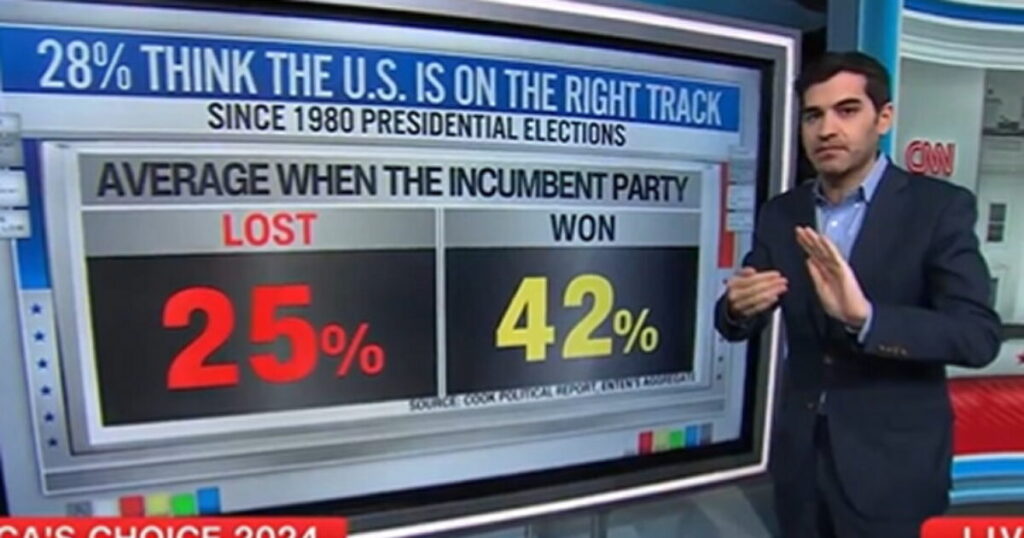In recent remarks, CNN data analyst Harry Enten highlighted a significant challenge for Vice President Kamala Harris’s campaign, indicating that the majority of Americans feel the country is on the wrong track. According to polling data, a mere 28% of Americans believe the United States is moving in the right direction—a stark contrast to historical norms that suggest incumbent parties tend to lose elections when public sentiment is similarly low. Enten points out that this perception of being off course is traditionally detrimental for the party in power, and the current figures reportedly mirror trends that have led to electoral defeats in the past. This situation presents a daunting obstacle for Harris, who is positioned as a key figure in the upcoming election.
Enten emphasizes the historical implications of the current approval rating, noting that when the incumbent party wins elections, the average percentage of Americans believing the country is on the right track is approximately 42%. The current 28% not only falls short of this average but aligns closely with historical data where elections were lost. Particularly, he references notable presidential elections—such as those in 1996 and 2004—where sentiment was similarly pessimistic, underscoring that a mere fraction more than the current figures (25%) often leads to electoral defeat. The implications of these numbers send a clear message regarding the potential vulnerabilities in Harris’s campaign strategy and the challenges she faces as an incumbent candidate.
Significantly, Enten notes that historically, elections where voter sentiment tilted toward a “wrong track” narrative have resulted in a demand for change, benefiting opposition candidates. In this context, the current landscape may favor former President Trump, who has positioned himself as the change candidate, potentially energizing voters who feel disenfranchised by the existing administration. As Harris prepares for her campaign, the overwhelming sentiment for change amplified by these figures introduces an inherent risk for her electoral aspirations, as historical patterns suggest a strong preference for new leadership during times of widespread dissatisfaction.
Moreover, Enten’s analysis suggests a strategic challenge for the Harris campaign and the Democratic Party at large, as they seem to be working to reframe Harris’s image to distance her from the incumbency narrative. To counteract the negative sentiment surrounding the current administration, Democrats are attempting to portray Harris as a fresh candidate, which may not resonate with the electorate given her current role as Vice President. This dilemma reveals the intricate balancing act that Democratic strategists must navigate in the coming months as they must hold the current administration accountable for its decisions while also proposing a forward-looking vision appealing to voters.
Additionally, Enten’s comments raise questions about the broader landscape of the upcoming election. With approximately 70% of the population expressing a desire for change, the Democratic Party faces the formidable task of convincing a skeptical public that their leadership retains relevance and vision. Harris’s campaign will need to articulate a compelling narrative that transitions past dissatisfaction into a hopeful outlook for the future, a narrative that, if successfully crafted, could potentially galvanize support. The uphill battle against a background of low approval ratings, however, marks a significant hurdle for the campaign, necessitating innovative strategies to engage the electorate effectively.
In conclusion, the Biden administration’s tenure appears wounded by public sentiment as highlighted by Enten’s analysis, which draws parallels between current approval ratings and past election outcomes leading to incumbent party losses. Kamala Harris’s campaign finds itself in precarious territory as it confronts the reality of a largely dissatisfied electorate craving change. The historical context outlined by Enten suggests that unless the Harris campaign can significantly shift public perception and rally support, the challenges posed by low approval ratings and a strong opposition stance could very well dictate the outcome of the upcoming elections. Navigating this complex political terrain will require deliberate strategy and an acute awareness of historical patterns among voters seeking change.

